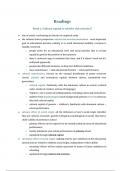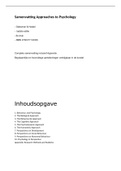Readings
Week 1: Cultural capital or relative risk aversion?
● aim of article: confronting to theories in empirical study
● the rational choice perspective: relative risk aversion mechanism - most important
goal in educational decision-making is to avoid downward mobility, everyone is
equally concerned
○ people strive for an educational level and social position that is at least
equally as good as the position of their parents
○ there’s universal urge to maintain that class, and if it doesn’t work out it’s
really bad apparently
○ people take di erent decisions, as they have di erent ambitions
○ class maintenance → take educational decision → school performance
● cultural reproduction: focuses on the unequal distribution of power resources
(social, cultural and economical capital) between classes, transmitted over
generations
○ cultural capital: familiarity with the dominant culture in society (cultural
codes, modes of conduct, and use of language)
○ ‘habitus’; one’s system of predispositions, including values and motivations
○ children from disadvantaged social backgrounds perform worse in school as
they lack cultural capital
○ cultural capital of parents → children’s familiarity with dominant culture →
school performance
● primary e ect of social origin: all the influences of one’s social origin (whether
they are cultural, economic, genetic, biological, psychological or social) that form a
child’s ability to perform in school
○ primary e ects can be expected to be exerted mainly in terms of educational
performance
○ mostly infuelnces your school performance in primary school
○ explained through cultural capital
● secondary e ect of social origin: making choices and ambitions in the educational
system that are related to children social origin, independent of their ability
○ secondary e ects will be mainly expressed in terms of future ambitions in
schooling
○ explained through relative risk aversion
, ● To what extent do the two mechanisms of cultural capital in the home environment and
relative risk aversion explain educational performance and ambitions?
● Results:
○ Variation in cultural capital and relative risk aversion across social origin
■ children from various social origins report similar concerns about
class maintenance
○ The impact of social origin on school performance
■ parental cultural capital (which stands for cultural reproduction
theory) has an e ect on primary education performance, and relative
risk aversion has not
■ parents’ educational level and their occupational class position
positively a ects children’s schooling
■ cultural capital strongly a ects primary school performance
○ The impact of social origin on schooling ambitions
■ parents’ educational level a ects choice of secondary school type: the
odds for being enrolled in a higher-ability track versus a
lower-ability track are higher for children of parents with tertiary
qualifications (secondary e ect of social origin)
■ relative risk aversion strongly a ects the aspired level of continuing
education: children who are more concerned with downward mobility
more wish to follow an ambitious educational programme
■ The more concerned people are with reaching the same class position
as their parents, the higher the aspired level of schooling at the age of
30
● Conclusion: in order to fully understand educational inequality we need both
mechanisms
Main finding:
● parent’s participation in highbrow cultural activities (→cultural reproduction)
predicts higher test scores during primary school but is unrelated to ambitions for
schooling
● concern about downward mobility (→relative risk aversion) does not predict grades
but explains di erent ambitions for schooling outcomes
● both mechanisms are found but at di erent points in the educational career
, Week 2: The Forms of Capital
● Capital is accumulated labor which, when appropriated on a private, i.e., exclusive,
basis by agents or groups of agents, enables them to appropriate social energy in the
form of reified or living labor.
● Three types of capital:
○ economic capital - immediately and directly convertible into money and
may be institutionalized in the form of property rights
○ cultural capital- convertible, in certain conditions, into economic capital
and may be institutionalized in the form of educational qualifications
○ social capital - made up of social obligations (“connections”), which is
convertible, in certain conditions, into economic capital and may be
institutionalized in the form of a title of nobility
● Cultural capital:
○ exists in three forms:
■ embodied state - long-lasting dispositions of the mind and body
■ objectified state - in the form of cultural goods (pictures, books,
dictionaries, instruments, machines, etc.)
■ institutionalized state
○ where’s the idea from: “initially presented itself to me as a theoretical
hypothesis which made it possible to explain the unequal scholastic
achievement of children originating from the di erent social classes by
relating academic success”
○ domestic transmission of cultural capital - the best hidden and socially
most determinant educational investment
○ ability or talent is itself the product of an investment of time and cultural
capital
○ scholastic yield from educational action depends on the cultural capital
previously invested by the family
○ The embodied state:
■ The accumulation of cultural capital in the embodied state, i.e., in the
form of what is called culture, cultivation, presupposes a process of
embodiment, incorporation, which, insofar as it implies a labor of
inculcation and assimilation, costs time, time which must be
invested personally by the investor
■ The work of acquisition is work on oneself (self-improvement), an
e ort that presupposes a personal cost







